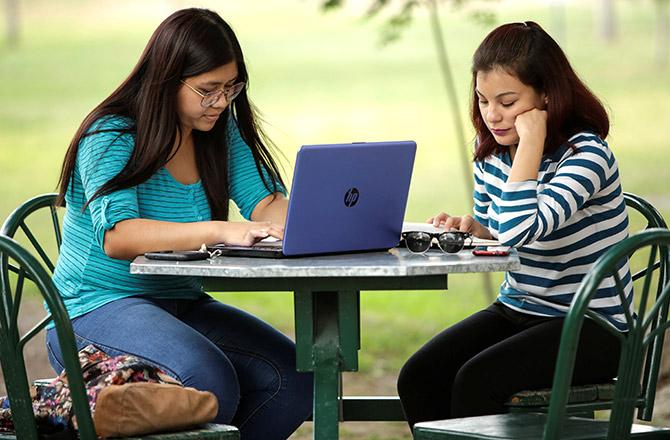Take an education loan.
Encourage them to freelance while studying, says Gurinder Bhatti, chairman and MD, ESS Global, an international education consultancy.

Photograph: Jose Luis Gonzalez/Reuters
There are many fantastic reasons for children entering the adult world to vie for an overseas education.
The world’s best educational institutions with amazing courses and programs of study are found dotted across the globe, and the sheer quality of the education accessible in these places is a great reason.
Another is the exposure to a new culture, a new people, and new opportunities that would get your child’s professional life to a great start.
For parents, it is an inescapable reality that sending your child abroad to study can be prohibitively expensive.
The average tuition fees for an education in the US -- the most popular study-abroad destination for Indian students -- is an incredible INR 88 lakh.
This does not account for various living expenses such as accommodation or studying supplies, which takes the cost of an average four-year course to be INR 1.4 crore.
For most middle class Indian families, this amount is just not something they can afford to spend, even though some parents get caught up in the enthusiasm of providing their child with the advantage of a high-quality education and end up depleting their savings or going bankrupt.
Here are some tips on managing the financial burden of sending your children abroad for higher studies:
Research and choose wisely
The old 'if your friends would jump off a bridge, would you do the same?' retort might have become cliché, but it is so for a good reason.
Students today often have their opinions on their education and professional life shaped by their peers, derived either from their friends or through social media.
Unfortunately, this herd mentality often prevents them from realizing that their dream education might lie away from the conventional choices.
Today, education has become a global industry, and several incredible institutions in countries like Australia and Canada can match the quality and opportunities of a US education at a fraction of the cost of tuition that the latter necessitates.
Living expenses in Canadian and Australian cities are not cheap either.
The massive rush for countries like the US and UK also make employment opportunities more difficult to obtain.
The prevailing political atmosphere makes it hard for US employers to take on too many foreign employees, thus diluting the draw of studying in these countries.
Further, several other countries are aggressively trying to attract Indian talent to their shores, meaning greater scholarship and visa opportunities.
Alternate sources for funding
While funding and scholarships aren’t easy to avail, there’s no reason to discard that option without exploring it.
Institutions tend to offer a limited number of scholarships for international students, either on the basis of merit, need, or a combination of both.
Other than the institution itself, philanthropic organisations both in India and abroad, educational trusts, alumni networks, and even governments offer financial support in the form of grants, fee-waivers, or scholarships.
These can be immensely useful in reducing your financial burden, and additionally gives your child something impressive to put on their resume.
Another option is taking an education loan for your child.
Banks and financial institutions often provide education loans at attractive rates on good terms, and a bevy of fintech start-ups are offering very attractive P2P or technology-driven easy loan options.
This can help your child avail this great opportunity without driving you and your family to penury, even providing them with an introduction to taking responsibility and driving their own future.
Part-time work
Another option that would both ease your financial situation while giving your child some of the responsibility for the cost of this opportunity would be them earning to cover some part of the expenses.
There are several part-time opportunities either in terms of research work on campus and can help students earn enough money to cover basic personal expenses and contribute towards larger educational expenses.
This would require a careful study of the immigration policies, however, since there are restrictions on the time and income international students can receive while on a student visa.
In today's digital age, students can even work freelance online, especially in the field of their study.
This will keep them on their toes while getting them good market experience to enhance their employment prospects.












 © 2025
© 2025